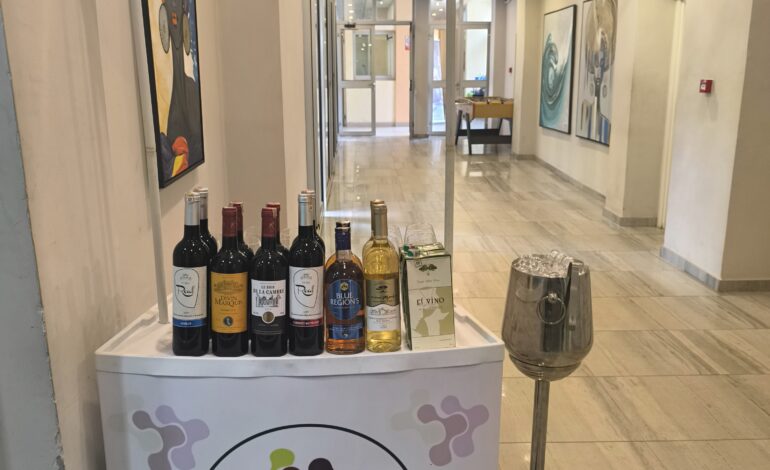A national stakeholder consultation and coordination session on misinformation and disinformation in the context of elections took place in Yaounde from May 14 to 15, 2025.
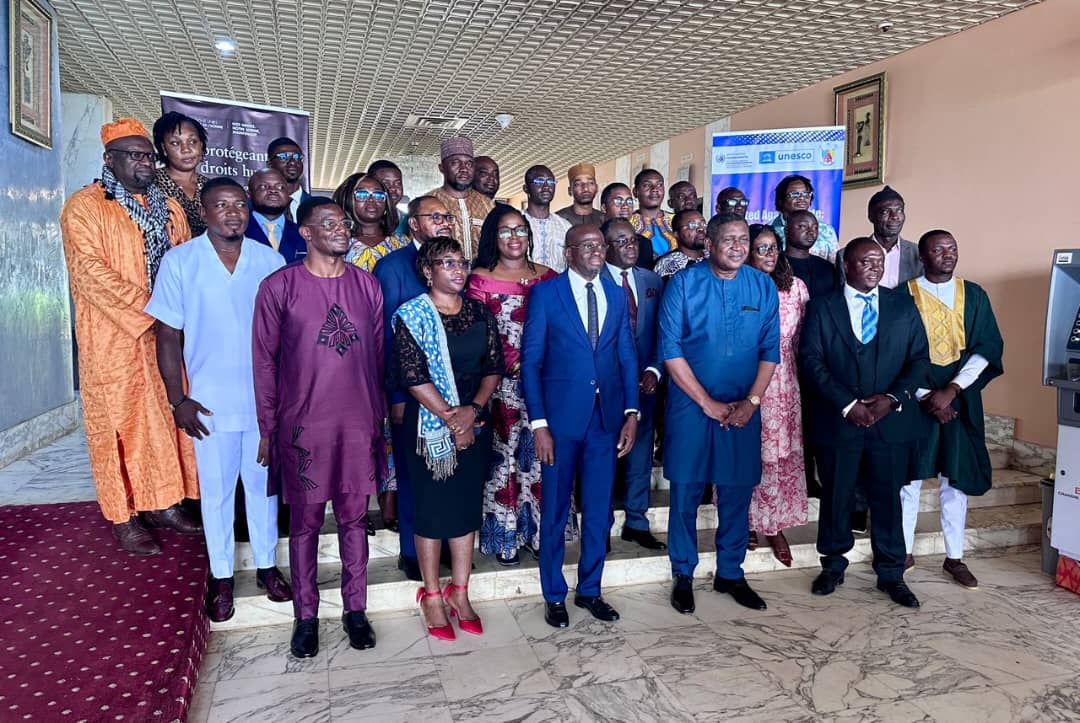
The two-day national stakeholder consultation meeting, organized in Yaounde from the 14th to 15th of May, 2025, aimed to promote a collaborative approach among key actors in Cameroon to counter disinformation, misinformation, and hate speech, thereby fostering social cohesion and democratic integrity.
Organized by the United Nations Centre for Human Rights and Democracy in Central Africa, together with its partners—UNESCO, Civic Watch, Local Youth Corner, and WILPF, this initiative brought together various stakeholders invited to share their collective expertise, develop a robust and coordinated response to the challenges of disinformation, misinformation, and hate speech in Cameroon.
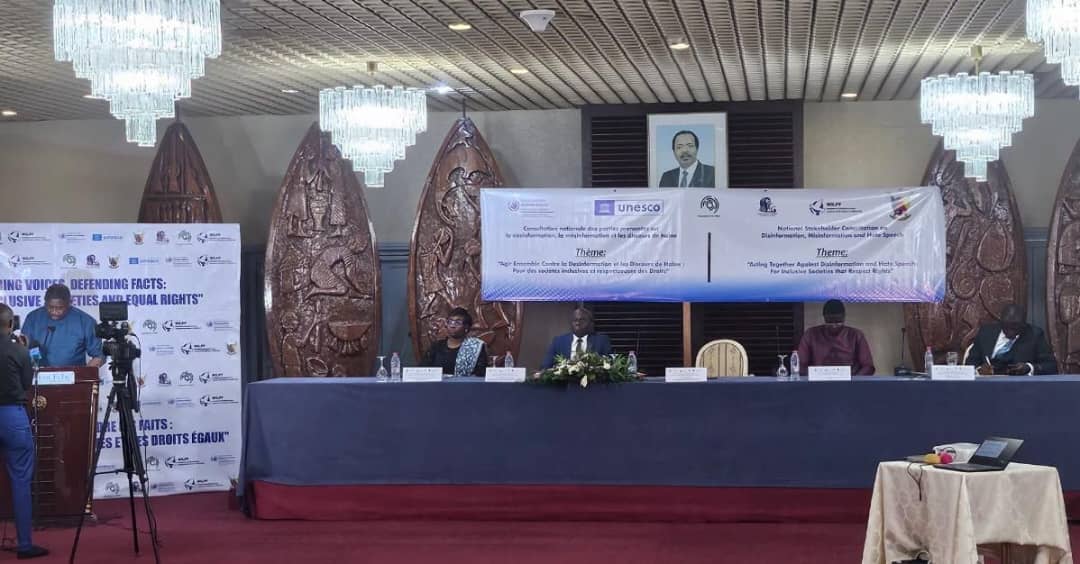
A Call for Collective Responsibility
Speaking on behalf of the Director of the United Nations Centre for Human Rights and Democracy in Central Africa, the acting Deputy Director said the digital sphere is spreading dangerously and sometimes insidiously in the communities, with real consequences on social cohesion, security, and integrity of the electoral process.
Dr Akobi Laurent, acting Deputy Director of the UNCHRD, stressed the importance of binding forces to combat these social scourges that affect living together.
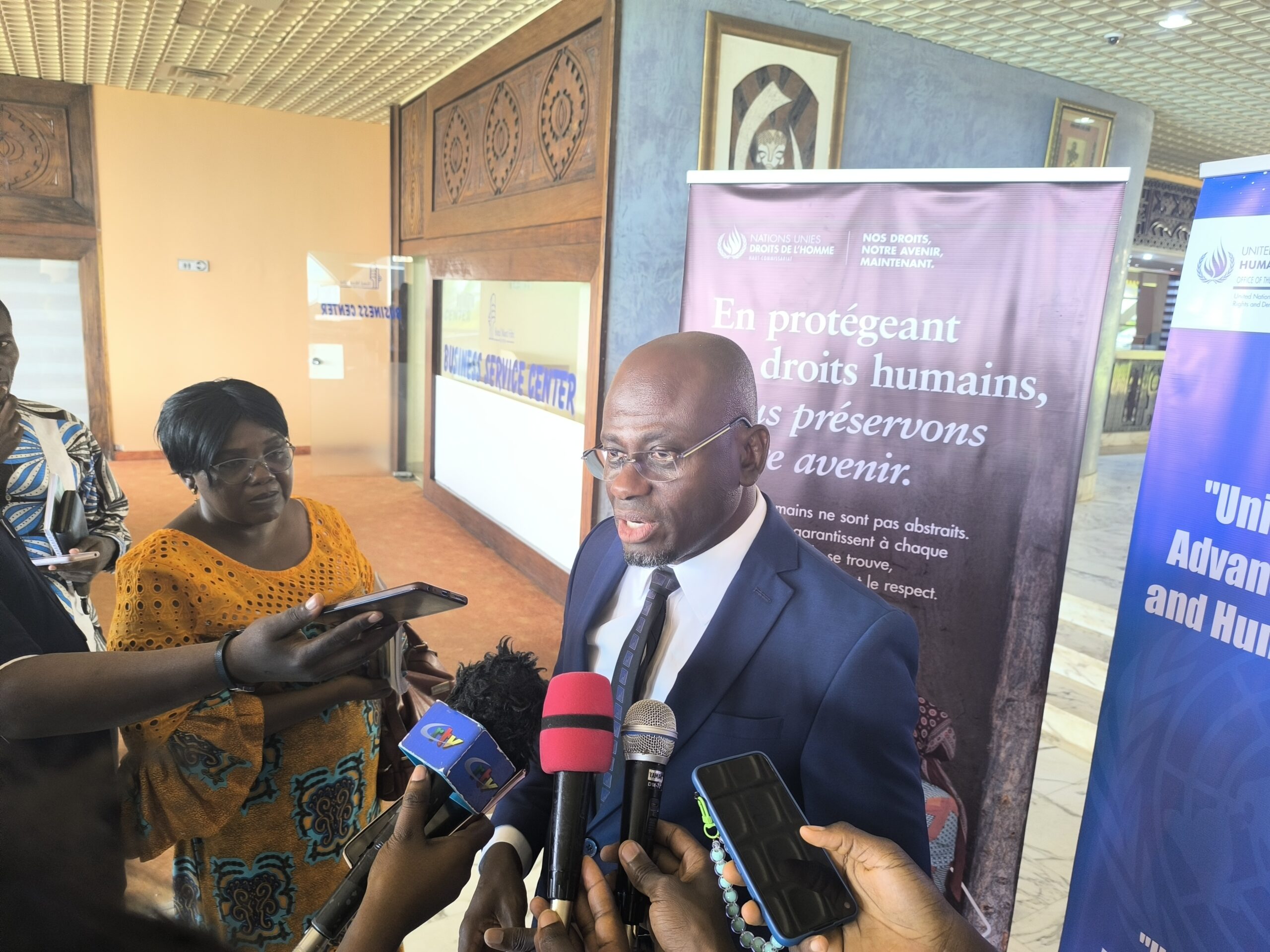
“In the face of this situation, our collective responsibility is clear. We must join forces to promote a culture of truth, a culture of tolerance, mutual respect, and shared responsibility. It is in this spirit that the present National Consultation is being held to build a concerted and structured response to these major challenges. This National Consultation does represent a privileged opportunity to build a coherent and concerted response to these major issues. The United Nations Centre for Human Rights and Democracy in Central Africa, in partnership with its several stakeholders, has placed this issue at the heart of its priorities. This commencement was reflected in January 2024 by the pre-adoption of a regional strategy and action plan to combat hate speech, which is currently pending endorsement by the Head of State of the region. As we gather here today to address this critical issue, it is important to acknowledge Cameroon’s instrumental role in the regional strategy to combat hate speech in Central Africa.”
According to Dr. Akobi Laurent, this comes together appears as a main challenge in the face of the world with regard to the stakes of upcoming elections in Cameroon.
He said: “Cameroon has demonstrated commendable leadership, including by hosting high-level consultations and advancing national measures aligned with regional and global standards. As the country prepares for the election this year, this is a pivotal moment to reaffirm and further demonstrate our leadership by fostering a media and information landscape that is rooted in truth, rooted in inclusion, and respect for diversity. The region, the world are watching, and Cameroon can once again set a positive example.”
In his keynote address, the Acting Deputy Director of the UN Centre for Human Rights and Democracy in Central Africa, did not fail to outline the crucial role of the media who is a director actor in changing the narratives.
Dr. Akobi Laurent stated: “To our partners in media, your participation in this consultation is crucial. It marks an important step toward the development of a national strategy framework and an inclusive roadmap to effectively combat misinformation, disinformation, and hate speech. Your expertise, your contribution, and your commitment will be decisive to the success of this initiative. We must work hand-in-hand, share our resources, connect our capacities, and strengthen public awareness through targeted campaigns and appropriate mechanisms, always placing the most vulnerable at the centre of our concerns. In this regard, the media play a central role. Their sustainable commitment to professional ethics, records, fact-checking, and steadfast defence of the public interest remains essential in safeguarding our democratic space.”
Preaching social cohesion
Chairing the official opening ceremony of this national stakeholders’ consultation, Secretary General in the Ministry of Communication, Pr. Felix Zogo praised the timely initiative of the UNCHRD-CA and partners, which comes at a moment when Cameroon is set to go for the presidential election.
He underscored the need to combat at all means the growing threats of disinformation and misinformation, not leaving on the side hate speech spread all over social networks.
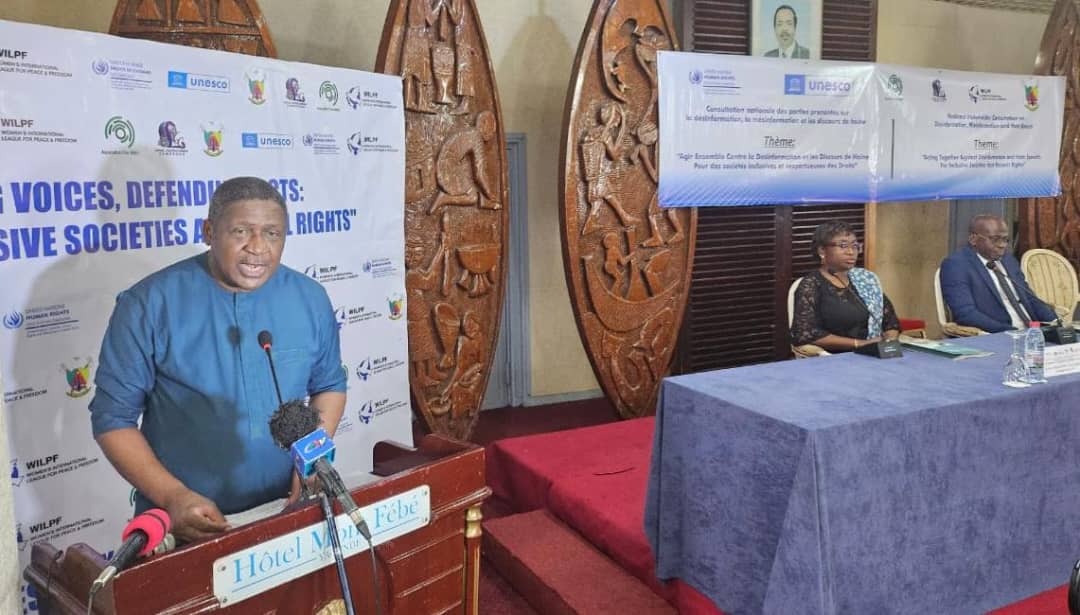
Pr. Zogo Felix said: “This issue is all the more important that we are only a few months away from the major political deadline that the presidential election can constitute for the future in the canals. To the observation and analysis of the exchanges that are already manifesting through the debates of the media, on the radio and television platforms, or the interventions that are brewing on social networks such as Facebook, TikTok, WhatsApp, and many others. We are already taking into account the extent to which such practices could generate as we move towards the end of 2025. It is therefore time for us to inscribe these dangers in the national agenda of our priorities, to prevent the harmful effects and the ongoing case of annihilation.”
The occasion was also well seized by Pr. Zogo Felix to outline some legal measures set up by the government to tackle hate speech, misinformation, and disinformation.
“Cameroon has an appropriate arsenal to this effect, constituted by the penal code that reprisals the for outrage against a race or a religion to which one or more citizens or residents belong, implying that these penalties are doubled when the infringement is committed to arouse hatred or contempt between citizens and residents. Other provisions of the penal code directly apply to anyone who holds hate speech or commits violence against people for their tribal or ethnic affiliation. When the author of the hate speech is a public agent, an information officer, a politician, a media, or a religious institution, the penalties are doubled and the diminishing circumstances are not admitted. Moreover, since December 21, 2010, the Cameroonian legislation has been endowed with a legal tool repressing misinformation and hate speech by electronic means. This is the law number 2010-12 of December 12, 2010, concerning cybersecurity and cybercrime.” He added.
The opening session was equally marked by an inaugural lesson delivered by Civic Watch’s President, Dr. Ngala Desmond Ngala, on: “Empowering Voices, Combating Disinformation: Youth and Civil Society at the Frontline for Democratic Integrity”.

Dr Ngala Desmond emphasized on the need to empower the youth and actors of the civil society as they are major key players in the fight against disinformation.
He said fake news have crippled some communities, creating divisions and tensions.
“Ethnic and linguistic tensions have been inflamed through false narratives, democratization, and scapegoating. Political actors and unknown tech parties have used disinformation tactics to de-legitimize oppositions, suppress dissent, again, I insist on this, and stop fear amongst voters. Fake news, which is a combination of mis-, dis and mal-information around electoral processes, has become a reality. In some regions, the mere act of sharing a manipulated video and or fake headline has resulted in violence.” He outlined.
As indicated by the organizers of this national stakeholders’ consultation, the fight against hate speech is currently a priority in the Central African subregion.
In January 2024, in Bangui, Central African Republic, ECCAS Ministers of Communication pre-approved the regional strategy and action plan against hate speech, a document expected to be endorsed by Heads of State.
This coordinated regional approach will ensure consistency and effectiveness in the fight against hate speech through the sharing of best practices, resources, and expertise among countries, leading to stronger and more comprehensive measures not only in Cameroon but across the region.
This national stakeholder consultation meeting comes ahead of a high-level meeting scheduled to take place in Yaounde on June 18, 2025, on the sidelines of the International Day for Countering Hate Speech.
Elise Kenimbeni


